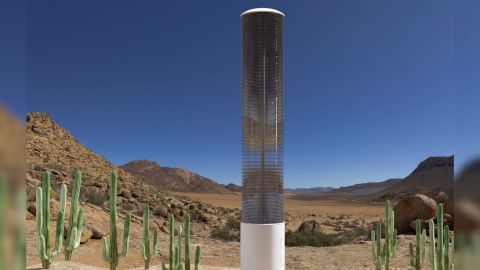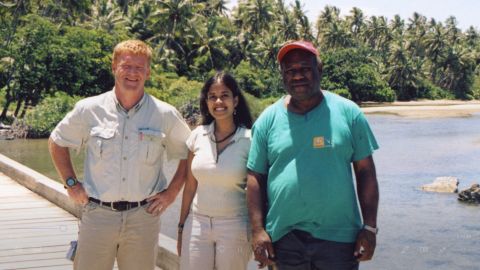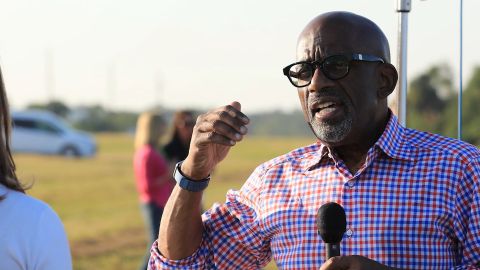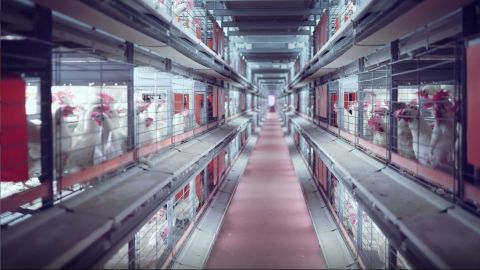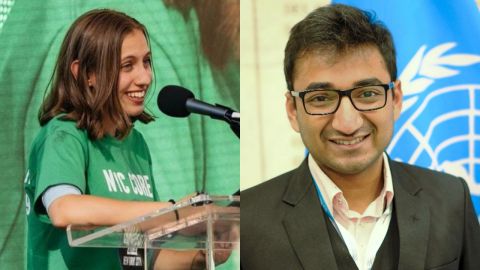As climate change makes wildfires stronger and more dangerous, how do we prepare for both the environmental and the emotional toll it takes? In this episode, we hear from those affected from Australia to California. Councillor Carol Duncan of Newcastle, Australia shares her experience working with fire refugees and her father’s harrowing near-death experience with wildfires. More from her story can be found on ASU’s Voices from the Future series.
Record breaking brush
fires are the calling
cards of climate change.
How one person is using
them to tell a story to
move the planet forward.
Hi everyone, I'm Frank
Sesno and welcome to
Planet Forward from the
George Washington
University, produced in
association with the
Global Futures Laboratory
at Arizona State
University.
Well, searing heat,
terrible drought,
tinderbox forests,
devastating fires in
California, Colorado,
Oregon, across the West
and in Australia, where
bushfires over the last
year burned 46 million
acres, about the size of
Syria.
Carol Duncan knows these
fires well.
Too well.
Her father lost
everything.
He almost died.
She quit her job to work
with fire refugees.
Now a city council member,
she's advocating for
change.
She's one of the Global
Futures Laboratory's
"Voices From the Future."
Hi, Carol.
I know this is personal
for you.
So tell us the story.
It's very personal.
The bushfires in Australia
last summer were horrific.
They were unprecedented in
our time.
Three billion animals,
Australian native
wildlife, estimated to
have been killed in these
fires.
It also included the
destruction of my father's
home on the New South
Wales Nnorth coast and in
a fire in which he also
lost two of his friends.
You thought you were going
to lose your, you were
going to lose your dad to
this, right?
What happened there?
Yes, I did.
I was actually on a video
meeting in the afternoon
and my father was calling
me and I was looking at my
phone, just going "oh, not
now," but I answered it
and he told me that they
were very worried about
the fire, that they were
going to go into their
large steel shed.
And I suggested to him, I
think you should head
across the road to the
public school.
This is a tiny bush
village in Australia,
population maybe 140
people.
But you don't really tell
your dad what to do.
So he went into the steel
shed.
And that was the last that
I had contact with him for
several hours.
But I was on Twitter, on
social media, talking to
the Rural Fire Service
here in New South Wales.
And as a journalist, I've
done a lot of work with
them over the years and I
have good contacts, thank
God.
They saw what was going on
via social media and
actually sent people in to
get my father and his
partner out of the steel
shed.
But yes, otherwise they
would have died.
So this terrible thing
that did cost a lot of
people their lives, more
than 30, and that caused
so much devastation,
prompted you to take
action.
You started a GoFundMe
campaign.
You quit your job.
Tell us about that.
What you were doing and
why?
Frank, you and I have
reported on all sorts of
things over many, many
years.
And the words come out of
your mouth, you know,
"terrible disaster, people
left only in the clothes
that they're standing on
standing in." When that
actually happens to you,
it suddenly means
something terribly
different, even though you
empathize nd you feel that
you understand.
When that happened to my
father, I guess the urge
to for me was was twofold.
One, the daughter in me
wanted to make sure that
he was safe and that he
was OK, as OK as you can
ever be when you survive
something like this.
The journalist in me was
determined to not let this
simply become another
media story along the
lines of "horror start to
Australia's bushfire
season." That's what we
hear every year.
I had the opportunity.
I took my shot to try to
tell that story more
broadly and to bring that
message home to people
that this, bushfires
happen in Australia, they
happen in America, but
that what we are seeing
due to climate change is
they're bigger, they're
more ferocious, they are
deadlier, and they start
more easily.
The vast majority are
started by lightning and
by storms.
So it was important to me
to just try to use my
dad's experience, with his
blessing, to talk to as
many people as I could.
I had no idea if my father
had insurance or not.
Turns out he did.
And so what we then did
with the funding was we
put it into New South
Wales Rural Fire Service.
We put it into a local
charity that was helping
people affected by the
fires on the ground up
there.
My father said to me, just
put aside enough for my
funeral, give everything
else to people who really
need it.
So that's what we've done
with that.
Coal is alive and well and
still very much an export.
Fossil fuels are alive and
well, just as in the
United States, coal and
fossil fuels are alive and
well.
What do you say to that?
One of the things
politically that we're
struggling with within
Australia at the moment is
a just transition.
So here in our backyard,
in the Hunter Valley,
where we have coal jobs
and the port is coal jobs,
we are needing to really
talk to people about what
a just transition for
those jobs looks like
because we can't just go
and turn off coal.
We would destroy
communities by doing that
and the economy.
But surely, we can be
taking the money that is
being spent by the federal
government, in particular
in subsidizing fossil fuel
industries, the old mates
network, and putting that
amount of money into
genuine, just transition
and showing people what we
can do with new green jobs
that are high paying jobs.
What can America learn
from Australia?
You need a president who
will get on board and
desire to bring people
along with them, him or
her, and and explaining
what we have to lose,
which is frankly just
about everything if we
don't act.
What is it that you try
when you have people's
attention as a
storyteller, as a
communicator, to convey?
What we have to lose and
the loss is immense.
It is personal, in the
case of my father.
It's lives in the case of
many people across
Australia and America and
Europe.
We have everything to
lose, but we also have so
much to gain if we if we
act and we are successful
in communicating to people
what this really looks
like and what this really
means.
I think one of the the
best ways for me to do
that is to talk again and
again and again about what
happened to my father,
about the grief that
people go through with
this sort of loss.
For the first few weeks,
my father wished he hadn't
survived.
To hear that is...
he actually didn't tell me
that, I heard that from
one of my brothers.
I don't know that my
father could bring himself
to tell me that.
But to feel like that to
feel hopeless is
everything that we need to
pull back from so to share
dad's story.
He's just turned 84.
He's nine months later
only just moved into a
home of his own again.
And it's a nice little
house, but it's all gone.
Everything of his life is
gone.
Why did he not want to
survive?
Why did he say that?
I think it's the grief and
the shock and the terror
of, and grieving is a
process that that you have
to go through.
And I think it at 84, he
felt that it was just too
awful to have to live
through and to try to get
to the other side of that.
I'm so glad that he
survived and I'm so glad
that he is largely
speaking more positive
about it now, although
scratch the surface and
the trauma is right there.
We have the ability to
turn this around and to to
slow this horrible ship at
sea down over the next 10
or 20 years.
And we've got to do it.
Thanks a lot, Carol.
Oh, you're very welcome.
Thank you.
Is this really what we
have to look forward to?
Is it inevitable?
Is this the future?
What's the perspective of
those who will live it?
I want you to meet Lily
Young.
She's from California, a
junior now at George
Washington University.
She grew up with the Santa
Ana winds and the fires
they fan.
She posted the story at
Planet Forward.org.
Growing up, she writes,
I've experienced more fire
days than snow days.
Hi, Lily.
Tell me about those fire
days.
Growing up in Southern
California, we never
really had snow days.
Rather, I remember being
five years old and waking
up and seeing an orange
sky, opening those windows
and smelling smoke and
ash.
And we'd inevitably get
that call from school that
we had a fire day where we
wouldn't come into school
because the air quality
would be so poor or the
fires be too close to us.
And then throughout the
years, time after time,
the fires got longer and
they got more intense.
I knew more and more
friends or more and more
loved ones who lost their
homes in a lot of these
fires as well.
So it's definitely gotten
worse over the past few
years.
I, for the first time
ever, experienced a fire
that came close to my home
in 2018.
Around this time at
Thanksgiving, where we saw
fire come right across the
street from our home.
Luckily we didn't lose our
home, but a home in our
neighborhood did burn
down.
The trees are scorched and
black and any fences are
melted or incinerated.
Ash marks in the road or
hills, even white with ash
and then wind blows and
it's black underneath.
So it's very stark,
horrible imagery.
But I do have friends that
even two years after these
fires that really impacted
my neighborhood
specifically are living in
trailers on the property
that their home once
stood.
This past summer, we had
our home insurance company
come to us and say we can
no longer insure you.
That kind of stress to
constantly have looming
over you that your house
might catch on fire the
next time the Santa Ana
winds come into town is
extremely stressful.
You never know what's
going to happen.
And it's also very
unpredictable where these
fires go.
So realistically, within a
day, it could be home or
no home at the end of that
fire season.
California is always a
state that has drought.
That's just how it is.
But when the hills are so
dry that one spark from a
light post or one lighter
that gets left in the
grass lights an entire
wildfire, that's something
that is seriously wrong.
So what do you want to do
about all this?
I mean, in your, in your
studies, in your career
aspirations, in your
personal life?
These wildfires are just
my personal connection to
climate change as a whole.
And I think that this
year, more than ever, I've
seen climate being talked
about in the news, being a
regular topic of
conversation.
And that is very helpful
for me.
I specifically, I'm a
marketing major, so
sustainability isn't
necessarily my course of
study.
That being said, I've
still found a lot of ways
to practice sustainability
in my coursework and to
strive to align myself
with people that are
looking for those
sustainable measures and
companies that are
dedicating themselves to
that sustainability.
This is an interesting
kind of trend that I've
been seeing where
companies are focusing on
being sustainable.
And I think more and more,
we're going to see that
becoming the status quo.
And I think realistically,
it comes down to the
consumer decision.
And also I just think that
by aligning yourself and
dedicating your own
personal efforts to a
mission that aligns with
sustainability and
fighting climate change, I
think that you can do a
lot of good in the world.
Well, I hope you will do a
lot of good in the world.
Thank you very much for
spending some time with us
here.
Yes.
Thank you so much.
Yeah, good luck.
Change the world.
Thank you.
California, Australia,
worlds apart, but on the
same planet.
Carol Duncan says the fire
was a catalyst.
Lily Young says at least
more people are talking
about this problem now,
aware of it.
But awareness needs to
lead to action, bold and
innovative, if we're
really going to move the
planet forward.
For the George Washington
University and the Global
Futures Lab, I'm Frank
Sesno.

